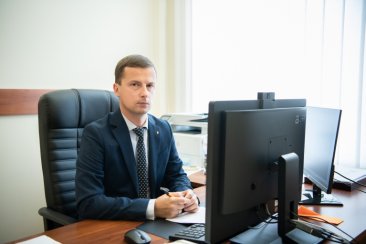Contact center of the Ukrainian Judiciary 044 207-35-46

On September 14, 2021, Albert Yezerov, Judge of the Judicial Chamber on Cases on the Protection of Social Rights of the Administrative Cassation Court within the Supreme Court, took part in the First Mariupol Constitutional Forum "Human Dignity and Ensuring Human Rights in the Context of Social Transformation". The event was organized within the framework of the project "Support to the Protection of Human Rights Through Improving Access to Constitutional Justice" of the OSCE Project Coordinator in Ukraine in cooperation with the Constitutional Court of Ukraine (CCU).
The Judge of the Administrative Cassation Court within the Supreme Court made a presentation on the topic "Social Rights in the Constitutional Legal Order of Ukraine." Albert Yezerov noted that the social policy of the state depended on the level of economic development of the country and its economic opportunities. That is why, in comparison with civil and political rights, guarantees for the realization of social rights are less developed. "The social orientation of the constitutional responsibilities of the state corresponds to social human rights, the essence of which is to ensure the normal conditions of human existence, even within the subsistence level established by the state. This position is also adhered to by the Constitutional Court of Ukraine which states in the Decision of May 22, 2018 No. 5-р/2018 that in a state that is proclaimed social, the amount of the subsistence minimum determined by the legislator must effectively ensure a decent standard of living,” the judge noted.
The speaker is convinced that the state is called upon to guarantee a special balance between its anti-crisis decisions and the fundamental rights of citizens. At the same time, ensuring social rights is viewed as a duty of the state. By declaring Ukraine as a social state in the Basic Law the state policy is directed to creation of conditions that ensure a sufficient standard of living, free and comprehensive development of a person as the highest social value. At the same time, such consolidation of social rights at the constitutional level causes excessive and in some cases unjustified expectations among citizens.
Albert Yezerov noted that the CCU and courts of general jurisdiction should correct certain shortcomings of the constitutional model of social rights by their case law. He stressed that after the constitutional amendments of 2016 the CCU ceased to be the only body of constitutional jurisdiction, and Article 7 of the Code of Administrative Proceedings of Ukraine provided the courts with certain constitutional and jurisdictional powers: if a court concludes that a law or other legal act contradicts the Constitution of Ukraine, the court does not apply such a law or another legal act, and instead applies the norms of the Constitution of Ukraine as norms of direct action. In this case, the court, after making a decision in the case, appeals to the Supreme Court to decide on the issue of submitting to the CCU a petition on the constitutionality of a law or other legal act. The judge cited examples from case law which illustrated the application by the court of the norms of the Basic Law as norms of direct action.
The Judge of the Administrative Cassation Court within the Supreme Court Mykola Himon and the Head of the SC Department for Analytical and Legal Work Rasim Babanly also took part in the work of the First Mariupol Constitutional Forum.